|
Sacul
 By Ken Champion
By Ken Champion
My father, C. R. Champion, was a small man
who weighed maybe 135 pounds and stood about five feet and seven inches tall.
He grew up in Sacul and always loved the town.
He always wanted to be a writer and did
write some stories which I have kept. But he was at his best in being a
salesman who could talk to anyone and convince anyone of the need to buy.
In the years of the depression he did whatever
he could do to support wife and four kids. He worked for the W. P. A.,
building roads and bridges for a dollar a day. He went from house to house
selling whatever there was to sell.
Later, having no car, he would leave Sacul
at 2 a.m., on the train that came through, work all week, then come home in the
middle of the night again on Saturday morning. I remember him always stopping
by the beds, kissing all of us goodbye. For some reason it always seemed to
be winter and I worried about him having to walk to the depot, about 2 miles away.
He always loved being funny and acting
funny. In those times the local would be actors and actresses would get
together and present a play or two during the year. He was always a star-the
comic who got the most laughs. There was little in the way of entertainment,
so the whole town turned out.
My father always told me that he started smoking
at the age of ten or eleven, so in his middle fifties, he got emphysema and could
walk only a short distance before having to stop for rest.
This continued to worsen, and his joy of
life, his sense of humor, his gentleness, faded gradually, as his breathing got
more labored.
One night we received a phone call that he
had had a stroke and was in the hospital.
When we arrived, he was in a
semi-conscious state. I remember his rousing a bit and saying, "I've got
to go home."
He never got to go home again.
He lies buried in the little cemetery in
his beloved Sacul.
Return
to Top
Next
________________________________
That's Lucas ----Spelled Backwards
By Ken Champion ArkanCranford--Pharmacist--Doctor--Druggist--Friend Ark
Cranford lived in Sacul most of his life and had the only drugstore ever to be
there. 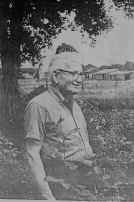 It was typical of its time.
There was a soda fountain where one could always get a cool drink of water in one
of those old-time, clear Coca Cola glasses. There were two small, round
tables with metal chairs, where one could, if the money were available, sit with
his girlfriend and have a soda It was typical of its time.
There was a soda fountain where one could always get a cool drink of water in one
of those old-time, clear Coca Cola glasses. There were two small, round
tables with metal chairs, where one could, if the money were available, sit with
his girlfriend and have a soda The
smell inside was delicious. There were the odors of perfume, powder, soups,
and the store was always cool and shaded. Mr.
Ark always had a cigar in his mouth, and, as far as I know, never lit it. He chewed
the end, and because the cigar was always there, he spoke in a muffled, somewhat
hard to understand voice. Although
he was only a pharmacist in our little town, he as also a doctor in many
ways. There wasn't a real doctor for miles, so Mr. Ark had to do. So, for
any ailment, one went to the drugstore and told Mr. Cranford about the
problem. He would mumble something, go back to where the pills, medicines,
balms, and salves were kept, mumble a bit more, and come out with something to do
or take or rub on. He also had available the Black Draught and little pink
pills we all used to clear out our bodies for the summer. The
drugstore was the place one went to buy Christmas toys. Most of us didn't get
any of these, but we did find out that all the toys were kept in a back
storeroom the rest of the year. There was one window in the room, and it had been
painted over. However, a bit of paint was missing in one corner of the
window, and we could, by peering in that spot, see all the goodies the year
round. And what a sight it was!! There were metal trucks, there were
colorful balls, tops, dolls, toy guns, everything and anything one could ever want
for Christmas. The last
time I saw Mr. Cranford was after I had been discharged from the Navy, had married,
and was attending college on the GI Bill. My wife and I had borrowed her
parents' car to visit my grandmother in Sacul. About two miles out of town
the car stopped--just died. A man driving by inspected the car and told me I
would need a new coil that would cost around twelve dollars. I didn't have
any money, so I walked to the drugstore and told my troubles to Mr. Ark. All
he said was, "How much do you need?" I made sure he was repaid as
soon as possible. Only one of
the Cranford daughters still lives in Sacul and this store has been closed for many
years. Being there, and seeing the old building re-news the memory I have of
Mr. Cranford. He was probably the only person who ever lent me money without
asking for interest or asking when I intended to pay it back. Return
to Top
Next
________________________________
Sacul Water Corporation
History
 By
Pearl Button By
Pearl Button
When the people of Sacul see a
need to improve their community, they go to work. In 1963 there was
quite a few residents' wells began to go dry. We had a meeting and
elected a committee to see about getting a loan from F. H. A.
The committee elected officers as
follows: Billy Lucas, President; Pearl Button, Secretary/Treasurer;
Ray Treadaway, Chester Whitaker and Calvin Corley.
The committee went to Nacogdoches
to Farm Home Administration to secure a loan. The requirements were
strict. There had to be at least 56 customers willing to tie on to
the water. The work began by getting 56 families to sign up to take
the water. We finally got 54 and went back to F. H. A. and asked if
we could get the loan on 54 customers and they said yes!
The work did not stop there.
We then had to secure easement from each land owner where the water lines
would be laid. We only had one to refuse us.
We secured a loan for $62,468.67
and hired an engineer to draw up the plans. Mr. Henderson gave us the
land to dig the well and put the well plant on. There was 12 miles of
line which included the McKnight community.
The Sacul Water Corporation has
grown and done well. We are now providing water to 144 customers. We
are in desperate need of another well and have applied for a grant to get
it drilled. It will take approximately $40,000 to dig another well.
Property has already been donated by Tommy King for the well. We seem to be
going down the list rather than up it to get the grant. With the
diligent work of the members of the Water Board we hope to soon have a
second well serving our community.
Return
to Top
Next
________________________________
The Village Smithy Stands
Anvil
Of Sacul Blacksmith Has Clanged Four Decades
By Phil Dilbert Courier-Times-Telegraph
East Texas Editor Sacul.--When
you step into the blacksmith shop of W. M. Gregory 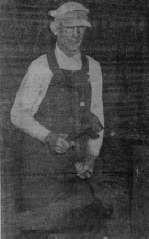 in this County
community, it is as though you have turned back time and entered an era of East
Texas history that was both more enchanting and more rugged than today's
anesthetized existence of glittering creature comforts. in this County
community, it is as though you have turned back time and entered an era of East
Texas history that was both more enchanting and more rugged than today's
anesthetized existence of glittering creature comforts. The
sagging, but durable shack on the edge of town, is truly an anachronism but
every stick, tool and chink in it has played a part in the life of Gregory,
whose anvil has clanged almost continuously for four decades. Gregory,
lean, erect and 72, has hammered out tons of horse shoes, farm implements
and wagon parts since 1913. He comes by his trade honestly. "I
was raised up in blacksmithing," he'll tell you, his blue eyes
sparkling through his spectacles. "My granddaddy was a machinist and
blacksmith back at Nolansville, Wilson County in Tennessee. He was
named J. P. Gregory. the J. P. stands for James K. Polk. And he
made boots and shoes for Gen. Robert E. Lee and Gen. Stonewall Jackson
during the Civil War. Look at this." He'll
hold up a curved piece of metal with a hole in one end. "This
here's a shoe float," he'll explain. "It was used to
take wooden pegs out of shoes durin' the Civil War." Then he'll
probably rummage around in an ancient chest and bring out several other
fascinating implements that felt the skillful fingers of men dead for
several generations. One
of these is a 14-inch hacksaw, a wooden mortising mallet, a draw knife and
a set of divided compasses, all manufactured before the American Revolution
and handed down to Gregory by his grandfather. They are all in
excellent condition and would doubtless bring a fancy price from a first
class museum. But these
articles are mostly of sentimental significance to Gregory. "That
was in the old loggin days of nineteen an'seven to nineteen an'fifteen."
he explains. "i charge from six bits to a dollar for a set of
shoes for a hoss or mule an' as high as five dollars for a stud hoss.
Then in nineteen an'twenty-two, =the trucks come and my horseshoein' done
fell off." In 1918
a fractious horse he was trying to shoe almost put an end to Gregory's
career. The animal, an Army surplus horse, reared back and kicked
Gregory so hard a section of intestine was ripped out. "Taken a
piece that big outa me," he says, pointing to his back.
"For a year I went around all doubled up. Finally made it all
right, though. Hit don't bother me none now." Gregory
took a couple of Tyler visitors through his shop last Monday morning.
When they greeted him at the threshold he was splitting kindling wood with
an axe. When they heard
of his 1919 mishap they expressed surprise that the injury hadn't left him permanently
stooped. "Hit's a
wonder hit didn't," he said. "When that horse kicked
me he knocked me right onto a square block over thar." He
pointed to a spot just outside the door. Spent four days in a hospital
in Dallas. Cost me $400. Taken me six to..... "Not
too much to this blacksmithin nowadays," he said.
"Mostly turn out axe handles and canthook handles. Makes very
few plow beams. Hit's mostly all steel stuff these days." Gregory
came to East Texas in 1884 with his family when he was only a year
old. The new settlers hailed from Nolansville, Tenn., which Gregory
says used to be nicknamed "Doolittle" for for some unknown
reason. The old blacksmith says he was named for Gen. William Miles
of Civil War fame. He
lives with his invalid wife about a quarter-mile from his shop. Mrs..
Gregory, the former Miss Mattie Adams of Rusk, is 69 and has been confined
to her bed for the past four years. Gregory
says he is not a member of any particular church. His belief is that
everyone is seeking the same God in a different way. Hit's like the spokes
in a wheel," he says. "They all lead to the
same central point." Return
to Top
Next ________________________________
The R. O. Treadaway Family
Mr. and Mrs. Treadaway (Richard Oscar and Maude Lee)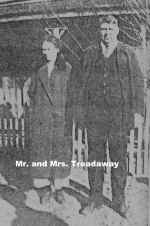 moved to Sacul in the year 1917 from the state of Louisiana where Mr. Treadaway was
a section foreman for the T. and N. O. railroad. Mr. Treadaway was forced to
leave the railroad industry because of a severe injury to his legs. This
family chose Sacul as their home because at the time it was a thriving community
with a good school and several churches. Mr. Treadaway started a crosstie
manufacturing company soon after his arrival in Sacul. After a short stint with
this endeavor, he began his lumber company. As this business began to grow,
he branched out to three other small towns located in Rusk county in the Joiner Oil
field, namely Carlisle, Selmon City, and Joinerville. After being in the
lumber business for many years, Mr. Treadaway had to retire because of ill healtMr.
Treadaway was very active in the development and growth of the Sacul school.
His interest in education was due to his experience as a school teacher. He
served as president of the school board of trustees for many years only to give up
that position when the Sacul school was forced to consolidate with Cushing.
Through his sincere love and devotion to the school in Sacul, he generously gave of
his time and finances. He gave the materials for the construction of the high
school gymnasium. Mrs. Treadaway was a beautiful person who spent much time
and energy serving church and community. And she had a full time job raising
a large family.
moved to Sacul in the year 1917 from the state of Louisiana where Mr. Treadaway was
a section foreman for the T. and N. O. railroad. Mr. Treadaway was forced to
leave the railroad industry because of a severe injury to his legs. This
family chose Sacul as their home because at the time it was a thriving community
with a good school and several churches. Mr. Treadaway started a crosstie
manufacturing company soon after his arrival in Sacul. After a short stint with
this endeavor, he began his lumber company. As this business began to grow,
he branched out to three other small towns located in Rusk county in the Joiner Oil
field, namely Carlisle, Selmon City, and Joinerville. After being in the
lumber business for many years, Mr. Treadaway had to retire because of ill healtMr.
Treadaway was very active in the development and growth of the Sacul school.
His interest in education was due to his experience as a school teacher. He
served as president of the school board of trustees for many years only to give up
that position when the Sacul school was forced to consolidate with Cushing.
Through his sincere love and devotion to the school in Sacul, he generously gave of
his time and finances. He gave the materials for the construction of the high
school gymnasium. Mrs. Treadaway was a beautiful person who spent much time
and energy serving church and community. And she had a full time job raising
a large family.
Mr. and Mrs. Treadaway raised nine children in
Sacul. There were five daughters, all of them school teachers. These
girls were Bertha Mae, Louise, Velmer. Maude and Willie. The four sons were:
Elmer, who was in construction; Sam and Gordon, who worked in the chemical 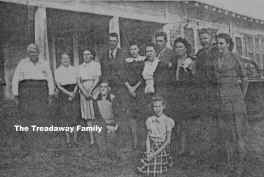 industry; and Ray, an accountant who at one time was vice-president of the Sacul
State Bank.
industry; and Ray, an accountant who at one time was vice-president of the Sacul
State Bank.
This community lost one of its most generous and
dedicated citizens with the death of Mr. Treadaway in 1948. Mrs.. Treadaway
passed away in July, 1957.
Return to Top
Next
________________________________
Dr. Treadaway Remembers
Early SFA
By Teresa Kyle
Taken from: The Sunday Sentinel,
Nacogdoches, Texas, Sunday June 13, 1976
Dr. Bertha Treadaway remembers when
excitement at Stephen F. Austin State University meant walking down to the railroad
and meeting the train every Sunday, and room and board cost $15 a month.
Dr. Treadaway was a member of the 1926
graduating class of SFASU and was one of the six of the graduates who participated in
(the) 50th anniversary reunion activities at SFASU in May.
She lives in Sacul in the northern part of
Nacogdoches County in a comfortable brick home which she shares with her constant
companion, a Chihuahua named Chiquita. The veteran education reminisced about
her teaching career with Chiquita nestled in her lap. Her rod and reel
was within easy reach in one corner of the room near a window filled with thriving
African Violets. Dr. Treadaway is a woman who loves the out-of-doors and likes
to take advantage of it as much as possible.
She retired from Southeastern State
University at Durant, Oklahoma in 1970 after spending 25 years in the Health and
Physical Education Department at that university. She moved back to her
childhood home in Sacul and built her home on the family property there.
Beginning her education in Nacogdoches
County, she later attended Stephen F. Austin State University. Dr.
Treadaway lived in the Langford house with 15 other girls while at SFASU and walked
to college everyday. The Langford house was located north of what is now SFASU,
and the girls walked to the present high school for classes everyday.
"I remember some of my favorite
teacher----Mrs. Jogot Harling, Miss Broadfoot, Mr. Garner and Mrs. Blount," said
Dr. Treadaway, who started out in college as a history major.
While attending SFA, she participated in the
women's recreation association, and got her first taste of what would be a lifetime
career.
After graduation from SFA, Dr. Treadaway
began looking for a teaching job, but in those days applicants had to do a little
more than walk in the office and fill out an application.
"We had to go out the day the school
board was scheduled to met to see each of the trustees, who was usually a
farmer. We had walk out to the fields right through newly plowed rows and he was
usually in the back 40 acres," she laughed.
Then we would meet with the board that
night, one at a time. There was a lot of competition for the jobs. Some
started teaching with temporary certificates after high school," Dr. Treadaway
remembered.
She was hired at Hallsville and taught for
three y ears there. She also served as girls basketball coach and was later
hired by the Longview School district as a basketball coach.
"At Longview I had a PE class with 250
girls, juniors and seniors. There's wasn't very much we could do but march and exercise,"
said Dr. Treadaway.
"Longview also hired Ed Sharp as a
coach at the same time and he couldn't teach math, so I had to take math and he took
history."
During her teaching years Dr. Treadaway
continued her own education during summer school session. She received her
Bachelor of Science and Masters Degree from Texas Woman's University in 1940-.
In the summer of 1945 she moved to Dallas
and worked for the Dallas Recreation Department for a few months. But she missed
her teaching and that fall began teaching at Southeastern State University in Durant,
Oklahoma. She had found her home, and the women's athletic department at that
university had found a fighter.
Dr. Treadaway was the only woman in the
department until 1962, 17 years after she started working. She created the
intramural program at SESU, later adding an extramural department.
Her tenure began right after World War II
ended, and male students were returning to the universities. Dr. Treadaway said
the students needed some social activities so she initiated a recreation program and
founded a week-night student dance that is still popular at SESU.
Dr. Treadaway always worked to build up
women's athletics both in her high school and her years at SESU.
"It was thumbs down on basketball for
girls. Women have really had to fight to get recognition in something like that,"
she said.
While at SESU, Dr. Treadaway attended summer
sessions at TWU and received her Ph. D. in physical education in 1960.
She has traveled extensively and two of her
favorite spots are Hawaii and Colorado.
She said students have changed since she was
in school. "So may didn't have very much money then. And they had to
make good--they had to study," she added.
The lady is retired from teaching now but
she stays active. She and Chiquita often take Felipe (her name for every car she
has ever owned) out for a drive. She takes care of her herd of Black Angus cattle." They're
beautiful. I wish you could see them," she remarked.
She goes fishing every chance she gets and
still plans to write a book on physical education.
"I just haven't got around to it
yet," she said. She showed several of her afghans which crochets in her
spare time.
Dr. Treadaway was named to Who's Who in
American Education, Who's Who of American Women, the Dictionary of International
Biography and the 1970 Creative and Successful Personalities of the World. When
she retired from SESU in 1970 the Board of Regents of Oklahoma Colleges passed a
resolution in special recognition of Dr. Treadaway's 25 years of faithful and
dedicated service to education.
"I never regretted my teaching
career," she said. "I had originally planned to teach for three years
and then go back to school and be a medical doctor, but I just got so involved with
teaching."
Return
to Top
Next
________________________________
Sacul Memories
Arthur William Clemons
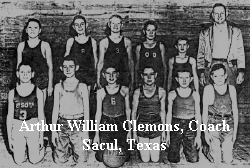
As I attempt to recall some memory of my
early years in Sacul, one of the fondest memories comes from my High School
Days. In the school year of 1938-39, I was a junior and the most outstanding
thing that happened during this year was the success of our Basketball Team.
Our team was composed of the following boys: Dolphus Chancelor, Leland Channel,
Cleatis Corley, Gordon Treadway, Kurth Booker, Garland Gresham, Jack Gresham and
Arthur William Clemons. Our coach was Melton Jacks.
During this year our team won the County
Championship. You have to keep in mind that at this time there was no school
classifications to win - you must defeat every team in the county. In the regular
season play we tied with Central Heights and were forced into a two out of three game
play-off. this was to be a home and home and if necessary, a third game on a
neutral court. The first game was played at Central Heights with Central
Heights winning by two points. Then the Sacul home game we won by one
point. This set the stage for a third game play off at the old Nacogdoches High
School gym. This game we won by one point. Isn't it odd that the total
points scored by each team in the three games were the same?
This event created much excitement in Sacul,
in fact so much that Mr. Alvin Corley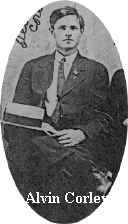 (local merchant and Post Master)
told us before the third game that if we won he would take the entire team to
Carlsbad Caverns, New Mexico. So when school was out for the Summer, Mr. Corley
and Coach Jacks loaded us up for the trip. This was really a great experience
for a group of boys that had hardly been out of Nacogdoches County for their entire
life. This event along with the trip for a climax, was just one of the Sacul
events I will never forget. (local merchant and Post Master)
told us before the third game that if we won he would take the entire team to
Carlsbad Caverns, New Mexico. So when school was out for the Summer, Mr. Corley
and Coach Jacks loaded us up for the trip. This was really a great experience
for a group of boys that had hardly been out of Nacogdoches County for their entire
life. This event along with the trip for a climax, was just one of the Sacul
events I will never forget.
Return to Top
Next
________________________________
My
Memories of Sacul
This "memory" was emailed to me by
Lowell Blackburn and is reprinted with his permission.
By Lowell Blackburn
I remember the depot t Sacul. I can remember
bales of cotton being stored there on the west side of the depot. The cotton
gin was back around on the other side of the road towards Cushing. I think the
McKnights ran the gin. I can remember going there with several loads of cotton
and watching the seeds get separated from the bolls and the seeds fall into a hopper
while the bolls were baled up in great big 500 pound bales. I wish I had some pictures
of that but I don't. I know there are lots of photos that were taken, but I
don't know who has them.
We lived on the west side of town on the store
front side on a back street. My dad played on the Sacul basketball and baseball
teams back in the late 1930s. I can drive right to the house but I can't remember
the street.
Doc Cranshaw ran the pharmacy.
He stitched my head up when I split it open by falling on a butter churn after
tripping over a red wagon while I was running at top speed. I was about four or
so. My grandfather's brother, Jess Blackburn, lived there in Sacul until thee
day he died. He was arrested on the steps of the Nacogdoches court house when he
was in his eighties for selling boot leg whiskey. For cryin our loud, he sold
it to a deputy on the courthouse steps. You will have to talk to Edith about
that one. His famous last words were, "Hell boy, I thought you was my
friend."
Letter From
David Dill
I received
this email from former resident, David Dill. The letter is
posted here with his permission. Thank you David for
adding your memories of Sacul to this page.
My name is
David Dill. I was raised in Sacul by my Grandparents,
George and Edna (Nanny) Dill.
I have so many
wonderful memories of Sacul that it would be impossible for me
to attempt to relate them here. But I would like to
mention some people that had a great influence on my life.
One of these people was Mr. Authur Clemons. A finer man I
have never known. He was a solid rock of the Sacul school
system, but most of all, he gave me a pattern of how a man
should be. Both strong and gentle. I have fell very
short of that pattern many times in my life but the pattern is
still there. Some others that I have such fond memories of
have already been mentioned on this site....Mr. Ark Cranford,
Mr. Will Gregory. And others like Mr. Dodd, Mr. Long, the
Button family, the Weaver family, the Applegate family, and so
many others.
There are only
a few people still in Sacul that remember my Grandfather Mr.
George Dill. I loved my Grandfather very, very much.
He was a very sweet man, but also a man with a very short
temper. I was a witness to that temper on a few
occasions. But I would like everyone who knew him to know
that after the war, he was a very tormented man. Both in
body and spirit. He had many demons of war to deal with.
And those who knew him well understood.
My Grandmother
Mrs. Edna dill was a wonderful woman that I loved so very
much. Everyone that still remembers her will certainly
agree with me.
I want to end
by saying that Sacul and its people hold a place in my heart
like no other place on earth. I hope someday I can return.
Return
to Top |